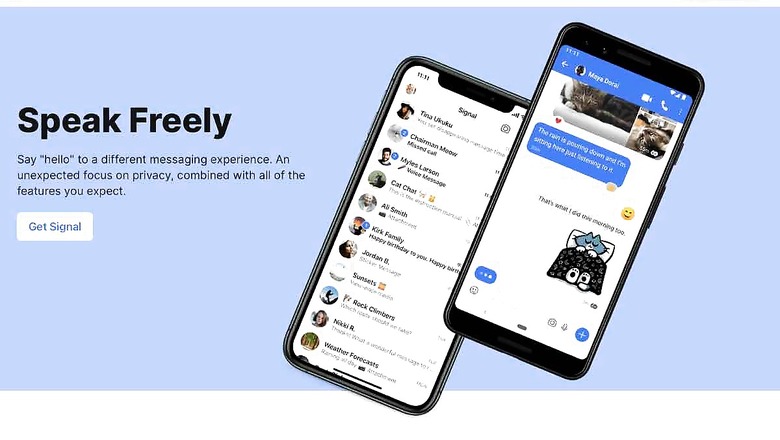
views
Encrypted instant messaging app Signal is reporting a surge in new signups and new users, which has resulted in delays in sending out the phone number verification codes. Signal, an instant messaging app developed by the nonprofit Signal Foundation, is a rival for instant messaging apps owned by Facebook, including WhatsApp and Facebook Messenger. There are two very popular reasons for why this may be happening, if we are to put two and two together with regards to the timing. First, the new WhatsApp Privacy Policy and Terms of Service that makes it even more clear that user data is being shared with Facebook’s other apps and services. And secondly, the new richest man in the world, Elon Musk of Tesla and SpaceX, who simply tweeted “use Signal” a few hours ago after the mob violence on the US Capitol in Washington.
The official Twitter account of Signal, @signalapp tweeted a few hours ago that they were “barely able to register our excitement” as new users signed up in big numbers. “Verification codes are currently delayed across several providers because so many new people are trying to join Signal right now (we can barely register our excitement). We are working with carriers to resolve this as quickly as possible. Hang in there.” Since then, Signal has confirmed that registrations are now happening without delay and thanked carriers for helping users sign up quickly.
It is no surprise this comes just a day after WhatsApp confirmed the new Privacy Policy and Terms of Service. While a lot of what is in the new terms has already been known, WhatsApp is now spelling it out clearly that user data is and will continue to be shared with Facebook and other Facebook products as well as services. WhatsApp also says that it tracks user location data at all times, and even if you are smart enough to turn off location access for WhatsApp on your Android phone or Apple iPhone, the app still collects and logs IP addresses and phone number codes to estimate your general location—WhatsApp says this is for diagnostics and troubleshooting.
Apple, after they rolled out the new Privacy Labels on the App Store for the iPhone, iPad and Mac, now mandate app developers to clearly state what user data they collect or don’t collect from users. The App Store Privacy Labels will have three sections—Data used to track you, data linked to you and data that is not linked to you. Under each section will be bullet points listing the exact specifics about the data being collected, including contact info, health and fitness data, financial info, usage data, browsing history, location data, personal identifiers and search history. With this information available at a glance, a user can potentially make a more informed decision about whether they want to download a specific app on the iPhone or iPad or Mac, without falling down the data collection and privacy blackhole that became the norm over the years.
In the subsequent revelations, it turns out that WhatsApp and Facebook Messenger collect significantly more user data in comparison with similar instant messenger apps such as Signal and Apple’s own iMessage. This includes health and fitness data, financial info, search history, user content, browsing history and location data. Signal app does not collect any user data, as per the App Store Privacy Labels.
As authorities and the global community took stock in the aftermath of yesterday’s violence at the US Capitol in Washington at a time when the joint session of the Congress was certifying Joe Biden as the President-elect, Elon Musk tweeted an image with the caption “This is called the domino effect”. He did not name Facebook or WhatsApp at any stage in his tweets, but the image of the dominos referenced what Facebook started out as—a campus website to rate women. Facebook has been at the receiving end of a lot of criticism for allowing content to remain on the platform that has led to serious societal divisions within the US with regards to supporting or not supporting outgoing US President Donald Trump. The tweet that followed, which said “Use Signal” also didn’t name WhatsApp.
Earlier today, Elon Mus surpassed Amazon CEO Jeff Bezos to become the world’s richest man and is now valued around $188 billion, according to the Bloomberg Billionaires Index. He has been quite nonchalant about it on social media though, with tweets saying, “How strange” and “Well, back to work…”
In the new Privacy Policy and Terms of Use, WhatsApp makes it clear that they do share information with other Facebook companies. “We may use the information we receive from them, and they may use the information we share with them, to help operate, provide, improve, understand, customize, support, and market our Services and their offerings, including the Facebook Company Products,” say the updated terms of service. Some of the listed utilities for this data sharing are believed to help in improving infrastructure and delivery systems, understanding how a user uses the platforms differently and also promote data safety and security across the board. Mind you, this also means that your data will be used to serve personalized suggestions as well as advertisements targeted at you and your usage trends across a variety of platforms. The WhatsApp updated terms say this is for “improving their services and your experiences using them, such as making suggestions for you (for example, of friends or group connections, or of interesting content), personalizing features and content, helping you complete purchases and transactions, and showing relevant offers and ads across the Facebook Company Products.”
Read all the Latest News, Breaking News and Coronavirus News here


















Comments
0 comment